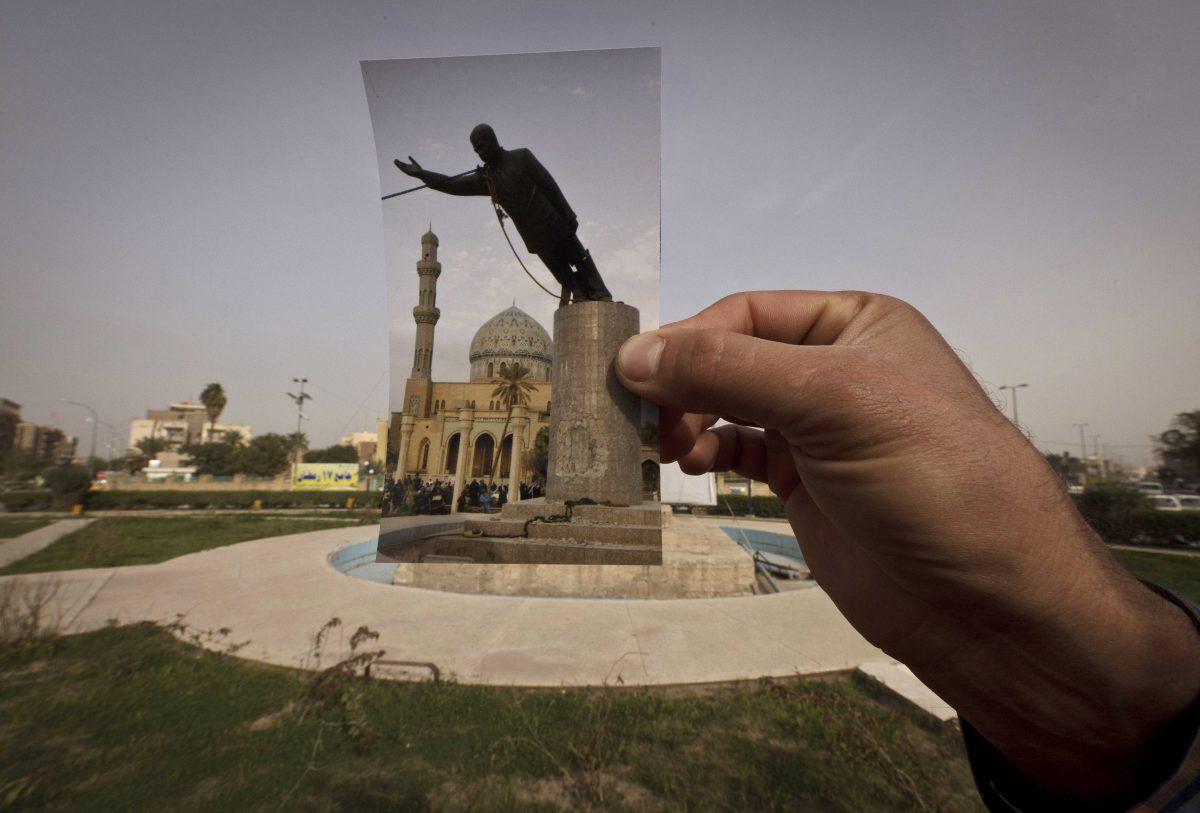Ten years ago today, American soldiers crossed the borders of Iraq, seeking to topple Saddam Hussein’s murderous regime.
They were told the dictator was stockpiling weapons of mass destruction, that he had ties to terrorist organizations like al-Qaida and that Iraq was a part of an “axis of evil.”
The mainstream media and the government largely pushed this view on the populace. The American public was largely duped.
Ten years of hindsight allows us to reflect on that time and examine what brought us into the tragic and costly war. It allows us to view, today as informed citizens, the information given to the American public and the ways the government and media pushed the country to war.
The Bush administration was by far the most vocal cheerleader for an invasion of Iraq. Bush himself had ordered Saddam to be looked into after 9/11, and the president often reminded the press and members of Congress that “the biggest threat” was Saddam and his WMDs.
Bush’s “axis of evil” speech and the long-running antagonism toward Iraq following the First Gulf War made Hussein an easy figure to rally opposition against.
The American media helped as well.
In the prelude to the war, 76 percent of all sources who appeared on network news were current or former government officials, according to a 2003 study by Fairness and Accuracy in Reporting (FAIR). Most would be for invading the country. Grassroots and anti-war figures were relegated to the margins, making up only 17 percent of sources.
The propaganda model developed by MIT professor and political dissident Noam Chomsky rarely had a more fitting case study.
The American media had stuck to its playbook, seeking government officials for “credible” information while ignoring the arguments against war and the public’s aversion to it. Before the invasion, most Americans were only willing to support a war if the United Nations backed it, according to USA Today and Gallup.
A particularly embarrassing moment for the press would be then-Secretary of State Colin Powell’s address to the U.N. Security Council. Powell used satellite pictures as evidence of an Iraqi buildup of WMDs and a vial of white powder to demonstrate how Saddam could have access to anthrax and other chemical weapons.
Much of the media reported Powell’s claims with little skepticism, and support for the war rose after this period.
The effect of the American media on the public’s perception of the Iraq conflict can be most easily observed by seeking public opinion polls from the time. A Program on International Politics (PIPA) study from that time reflects the widespread misunderstanding of the Iraq War.
In 2003, about 57 percent of Americans believed Iraq had a connection to al-Qaida. About 69 percent believed Saddam played a role in 9/11, and 56 percent thought the world either favored the war or was indifferent.
All of these positions are incorrect. There was a never a connection between al-Qaida and Saddam, Saddam played no role in 9/11 and the world was largely opposed to the war at the time.
Even 22 percent still believed the most widely known falsehood pertaining to the war — that WMDs had been found.
What’s worse is how the level of misconceptions affected support for the war. The PIPA study unsurprisingly found that the more falsehoods one believed concerning the war, the more likely one was to support it.
Certain media networks were worse than others.
Fox News, known for its conservatism and steadfast support for the Bush administration at the time, had the most uninformed viewers of all networks surveyed with 80 percent believing at least one misperception about the war.
Still, many say the war was justified for removing a tyrant like Saddam, often citing the brutal attacks he committed on his own people.
These people often fail to understand it was the West that helped build Saddam’s chemical weapons program or that the United States was supporting Saddam before, during and after his chemical attack against Iraqi Kurds.
The media’s failure to a adequately inform the American public and the public’s failure to adequately question the government teach us a lesson about the importance of skepticism.
Skepticism toward institutions of consolidated power – the government, the media, our favored political power – is an important tool for protecting ourselves against those who would fool us.
The Iraq War ended up costing anywhere from 100,000 to 1 million lives and trillions of dollars.
A little skepticism could have done a lot of good.





